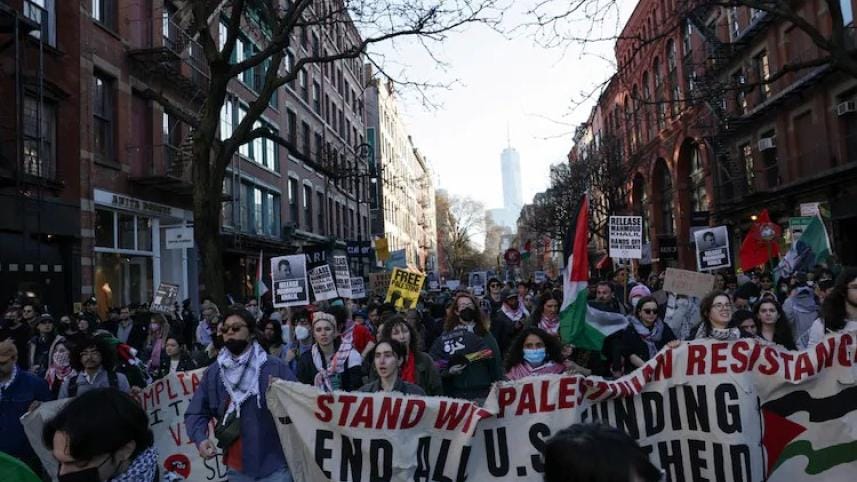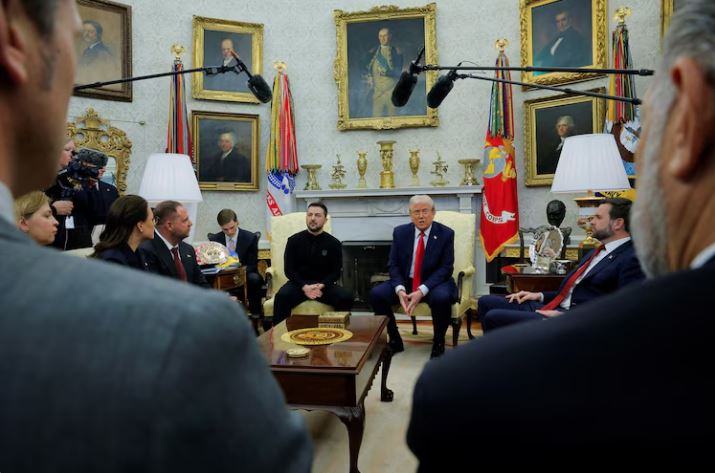How Mahmoud Khalil’s arrest threatens free speech on US campuses

On a damp March morning, the usual chatter of student life on campuses across the US felt eerily subdued. Just weeks ago, pro-Palestinian student protests had drawn thousands into vibrant encampments, their banners calling for an end to US military aid to Israel. Now, with the sudden arrest of Mahmoud Khalil, a graduate student of Palestinian ancestry, and the looming threat of deportation, a shadow had fallen over student activism. What had once felt like a fundamental right—the freedom to protest—was beginning to feel like a dangerous gamble.
Khalil was detained by federal immigration authorities on allegations that he had engaged in activities "aligned with Hamas." Tricia McLaughlin, a spokesperson for the Department of Homeland Security, in fact, said that the arrest was carried out "in support of President (Donald) Trump's executive orders prohibiting antisemitism." His green card now hangs in the balance, and his case has become the latest flashpoint in the escalating crackdown on student dissent. For international students across the country, the arrest signalled a grim new reality: their voices could cost them their future in the US. While Khalil's case has raised concerns among international students, it's important to note that he is a legal permanent resident, not someone on a student visa. However, there are broader implications for student activists.
The US has drawn millions of students from around the world, making its universities global centres of innovation, research, and intellectual debate. But these latest government actions risk dismantling the very foundation of that appeal. International students, often seen as guests rather than stakeholders, have always walked a tightrope—striving for academic excellence while avoiding controversy. Now, their presence on American soil feels even more precarious. The unspoken warning is clear: challenge US policy, and you might find yourself on the next flight out.
The financial consequences of such a shift are staggering. According to NAFSA: Association of International Educators, the world's largest non-profit dedicated to international education based in Washington, DC, international students contributed over $40 billion to the US economy through tuition payments and living expenses during the 2022–2023 academic year. They fill crucial roles in research labs, technology start-ups, and public health initiatives, forming the backbone of the country's intellectual capital. Universities, especially those heavily reliant on international tuition dollars, are already beginning to feel the tremors of what could become a long-term crisis.
The US government's use of immigration law as a tool to suppress activism has historical precedent. During the McCarthy era, immigrants suspected of communist sympathies were deported without clear evidence of wrongdoing. After 9/11, thousands of Muslim immigrants were subjected to surveillance, visa denials, and deportations under the guise of national security. Now, with Khalil's case, a new chapter in this long history is unfolding, one in which student activists—especially those critical of US foreign policy—become targets of the state.
Civil rights activists argue that Khalil's arrest is a politically motivated attempt to silence campus activism. But the government insists that national security is at stake. His legal team has pushed back, demanding to see hard evidence against Khalil, but so far, none has been publicly presented. Is this about safety, or making an example of him?
The chilling effect is already being felt. Students who once spoke freely are now scrubbing their social media accounts, avoiding protests and hesitating before signing petitions. The phrase "proceed with caution" has become a mantra among activists. Many are asking: where is the line? At what point does political dissent become a deportable offence?
Beyond the personal cost to activists, the economic and diplomatic fallout of these crackdowns could be severe. US' reputation as a beacon of free speech and intellectual freedom has long been a key driver of its global influence. The ability to challenge authority, to debate openly, to criticise policies without fear of reprisal—these are the principles that have been made. The US universities are considered to be the gold standard. But if international students start to feel that their presence is conditional on their silence, they may begin looking elsewhere.
For the US, the long-term economic consequences of losing its international student base could be profound. Universities facing declining enrolment would struggle to fund research programmes, graduate fellowships, and faculty positions. High-tech industries, which rely on a steady influx of international talent, could see a shrinking pipeline of skilled workers. In short, the very system that has allowed the US to maintain its global intellectual dominance could begin to erode.
What remains uncertain is whether Khalil's case will serve as an outlier or a blueprint. Will the government continue down this path, using immigration status as a political weapon against student activists? Or will legal challenges and public outcry force a course correction?
For now, the case hangs in limbo. Khalil's legal team has filed an emergency motion to block his deportation, and civil rights organisations are rallying behind him. But the larger question remains: what does this moment say about the future of activism in the US?
For decades, the US has presented itself as a champion of democratic values, a place where dissent is not just tolerated but celebrated. But for students, now watching their peers face arrest and deportation, that promise feels increasingly hollow.
And so, the banners may come down. The chants may be quiet. The crowds may thin. But the fear that has settled over the US' campuses will not fade so easily. The next generation of activists will remember this moment—not just for what was lost, but for the warning it carried: in the land of the free, speaking truth to power may come with a price.
Sarzah Yeasmin is a contributor to The Daily Star and works on the intersections of education and public policy. She is an alumna of Harvard University.
Views expressed in this article are the author's own.
Follow The Daily Star Opinion on Facebook for the latest opinions, commentaries, and analyses by experts and professionals. To contribute your article or letter to The Daily Star Opinion, see our guidelines for submission.




 For all latest news, follow The Daily Star's Google News channel.
For all latest news, follow The Daily Star's Google News channel. 

Comments